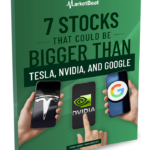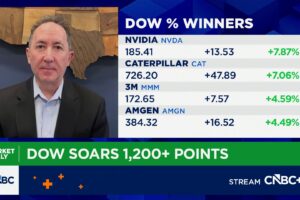We recently compiled a list of the Top 10 Stocks on Jim Cramer’s Radar. In this article, we are going to take a look at where Alphabet Inc. (NASDAQ:GOOG) stands against the other stocks on Jim Cramer’s radar.
Jim Cramer often reflects on how he would reform the American education system if it were up to him. According to him, one major change would be to incorporate personal finance education into high school curriculums. He compares this to mandatory health classes that teach practical skills, like dissection, which he finds less relevant compared to financial literacy.
In a recent episode of Mad Money, Cramer emphasizes that understanding money is crucial, and not caring about it doesn’t make someone virtuous; rather, it can lead to real-life problems like poor credit affecting personal and financial decisions, such as buying a car or a house. He notes that while conventional wisdom says money can’t buy happiness, being financially broke is undeniably challenging.
“If everyone in this country lost their minds and decided to turn America into Cramerica, you better believe I would make some changes. So, what would the 18th premiere of Jim Cramer look like? Hey, for those of you who didn’t get that reference, Google is your best friend. But because this is a show about money, let’s stick to the more mainstream elements of the Cramerican regime. For starters, it drives me nuts that we don’t really teach our young people how to handle their money. Would it be so crazy if you had to take a class on personal finance before you could graduate from high school? I mean, like those awkward health classes where they show you how to dissect a frog. I mean, come on!
So, can I just take a moment to speak some words that we all believe but very rarely get to say in polite conversation? Look, money’s important. It’s really important. And caring about the state of your finances does not make you seem like some sort of superficial bourgeois monster. Say you’ve got a lousy credit score and you want to get married—congratulations, you’ve just inflicted your horrible credit on your new spouse. Now neither you nor your partner will be able to qualify to buy a car or a home or perhaps even just get a darn credit card.”
Reflecting on his own experiences, Cramer recalls living in a car while still managing to save for retirement, which he views as a significant accomplishment. He encourages young people to invest early to achieve financial freedom and avoid dependency on their next paycheck. Through the CNBC Investing Club, he aims to guide young investors in managing their finances effectively.
“These things matter in life. They say money can’t buy happiness, but I’ve always found that piece of cliche conventional wisdom to be dubious at best. Because, hey, listen, being broke is a major buzzkill, as I know firsthand from the time I spent living in my ’78 Ford Fairmont for six months in California. I wish I had an expert to guide me through all this stuff back then. Although I still put money away for retirement while living in my car, I took it out of my homeowner’s budget.
So let me answer one of the most important questions out there: What the heck should young people do with their money? First, foremost, and always, you need to invest. That’s the only way you’re going to be able to achieve financial freedom. And by freedom, I mean living a life where you’re not totally dependent on the next paycheck. Teaching you how to do this is one of the reasons I actually put so much time and energy into creating the CNBC Investing Club. I’m always thrilled when I see younger members taking an active hand in managing their own money.”
Jim Cramer observes that many people begin saving and investing too late, complicating their financial lives more than necessary as they age. He also notes that younger individuals often feel they have plenty of time, sometimes starting to invest before they’re truly prepared. Cramer believes there are more prudent uses for their money at that stage.
“Too many people start saving and investing too late, making their lives a lot more difficult than they need to be as they get older. But I also know many young people feel that they have all the time in the world. Some start investing before they’re truly ready when there are, in fact, better things for them to do with their money.”
Cramer then offers three key lessons for young investors, especially recent college graduates. First, he stresses the importance of saving money, even if it’s not intuitive. He suggests investing in the stock market as a way to save, which can be more engaging than just keeping money in a savings account or CD. Investing helps keep your money from being spent impulsively because accessing it requires selling stocks.
Second, Cramer advises young investors to embrace higher risk in their portfolios. In their 20s, they can afford to take risks with speculative stocks or options because they have many years to recover from mistakes. In contrast, older investors should adopt more conservative strategies, focusing on safer investments like bonds and utilities. Cramer criticizes the idea of young investors holding a significant percentage of bonds, emphasizing that they should be more aggressive in their investments.
Lastly, Cramer challenges the notion that student loan debt should prevent young people from investing. He notes that student loan interest rates are generally lower than credit card debt and advises starting investments even while managing student loans. He also suggests that delaying student loan payments could be advantageous due to potential future loan forgiveness programs.
“Here’s the bottom line for young people just out of college: investing is a great way to trick yourself into saving money you might otherwise spend. Beyond that, remember when you’re young, you can afford to take a lot more risk with your portfolio. It’s never too soon to start contributing to your 401k or IRA, especially an IRA.”
Our Methodology
This article reviews a recent edition of Jim Cramer’s Morning Thoughts, where he covered various stocks. We highlight ten prominent companies he mentioned and analyze how hedge funds view these stocks. The article ranks these companies based on their level of hedge fund ownership, from the least to the most owned.
At Insider Monkey we are obsessed with the stocks that hedge funds pile into. The reason is simple: our research has shown that we can outperform the market by imitating the top stock picks of the best hedge funds. Our quarterly newsletter’s strategy selects 14 small-cap and large-cap stocks every quarter and has returned 275% since May 2014, beating its benchmark by 150 percentage points (see more details here).

A laptop and phone open to Google’s services in an everyday setting.
Alphabet Inc. (NASDAQ:GOOG)
Number of Hedge Fund Investors: 165
Morgan Stanley suggests that Alphabet Inc. (NASDAQ:GOOG) shares might be stuck in a trading range due to uncertainty surrounding the antitrust case that recently went against Google’s parent company. As a result, the analysts have reduced their price target for Alphabet Inc. (NASDAQ:GOOG) from $205 to $190 per share but still maintain a buy-equivalent rating. Jim Cramer notes that despite these challenges, Alphabet Inc. (NASDAQ:GOOG) remains a stock held by the CNBC Investing Club.
“Alphabet shares may be rangebound due to uncertainty around remedies in the antitrust case that went against Google’s parent company last month, according to Morgan Stanley. The analysts lowered their price target on the stock to $190 a share from $205 as a result, but kept their buy-equivalent rating. We own Alphabet for the CNBC Investing Club.”
Alphabet Inc. (NASDAQ:GOOG) has demonstrated a strong financial performance in its latest earnings report. Revenue reached $84.7 billion, marking a 14% increase from the previous year, driven primarily by notable successes in its Search and Cloud segments. Alphabet Inc. (NASDAQ:GOOG)’s operating income soared to $27.4 billion, and net income rose to $23.6 billion, highlighting substantial improvements. The Search business, which generated $73.9 billion in revenue, was particularly strong. YouTube advertising also showed growth, with a 13% increase to $8.66 billion.
The Cloud segment excelled, achieving a 28.8% revenue increase to $10.35 billion and surpassing $1 billion in quarterly operating profit for the first time. Alphabet Inc. (NASDAQ:GOOG)’s ongoing investment in artificial intelligence (AI) is expected to boost its growth further. Alphabet Inc. (NASDAQ:GOOG)’s focus on integrating AI into its Search and Cloud services positions it well for future success as AI adoption expands. Despite some challenges in the Network ads segment, Alphabet Inc. (NASDAQ:GOOG)’s robust performance in Search, Cloud, and AI suggests continued growth and profitability.
Baron Fifth Avenue Growth Fund stated the following regarding Alphabet Inc. (NASDAQ:GOOG) in its Q2 2024 investor letter:
“We also added to Alphabet Inc. (NASDAQ:GOOG). The company reported solid financial results with first quarter revenue growth of 15% year-over-year, driven by 14% growth in search, 21% growth in YouTube, and 28% growth in cloud (which accelerated from 26% growth in the fourth quarter). The company has also increased its cost discipline efforts, which drove operating margins to 31.6% (compared to 25% in the first quarter of 2023). With regards to GenAI, while we are cognizant of the potential risks to the dominance of search, we believe that on the range of outcomes, Alphabet remains well positioned through its massive user distribution (9 products with over 1 billion users each), long-standing AI research labs (DeepMind and Google Brain), top AI talent, a solid cloud computing division in Google Cloud, and deep pockets for investing in AI.
During the quarter, Alphabet also held its annual I/O conference, where it provided an update on its efforts in AI including: Gemini is now used by 1.5 million developers; model quality is expanding rapidly (e.g., context window is now 2 million tokens of length); the new genomics model, Alphafold 3 can predict structures of molecules and potentially accelerate drug discovery; new TPU6 AI chips has shown a 4.7 times improvement in compute performance compared to the prior generation; and Gemini for workspace is showing early data on a 30% increase in user productivity. Alphabet also has real value in assets such as Waymo, which are not factored into valuation today (and are potentially included at a negative valuation as they currently generate losses, hurting EPS). We continue to believe that the current valuation of Alphabet presents an attractive risk/reward for long-term owners of the business and have therefore increased our position.”
Overall GOOG ranks 2nd on our list of stocks on Jim Cramer’s radar. While we acknowledge the potential of GOOG as an investment, our conviction lies in the belief that under the radar AI stocks hold greater promise for delivering higher returns, and doing so within a shorter timeframe. If you are looking for an AI stock that is more promising than GOOG but that trades at less than 5 times its earnings, check out our report about the cheapest AI stock.
READ NEXT: $30 Trillion Opportunity: 15 Best Humanoid Robot Stocks to Buy According to Morgan Stanley and Jim Cramer Says NVIDIA ‘Has Become A Wasteland’.
Disclosure: None. This article is originally published at Insider Monkey.











